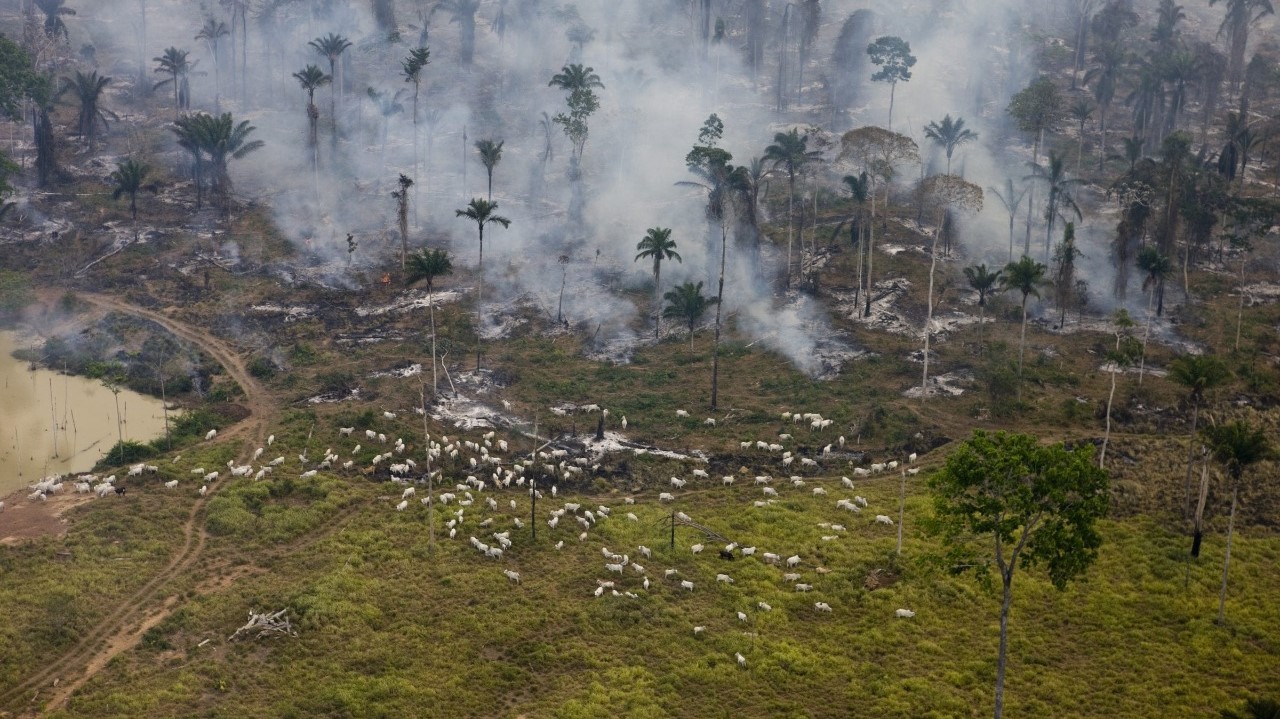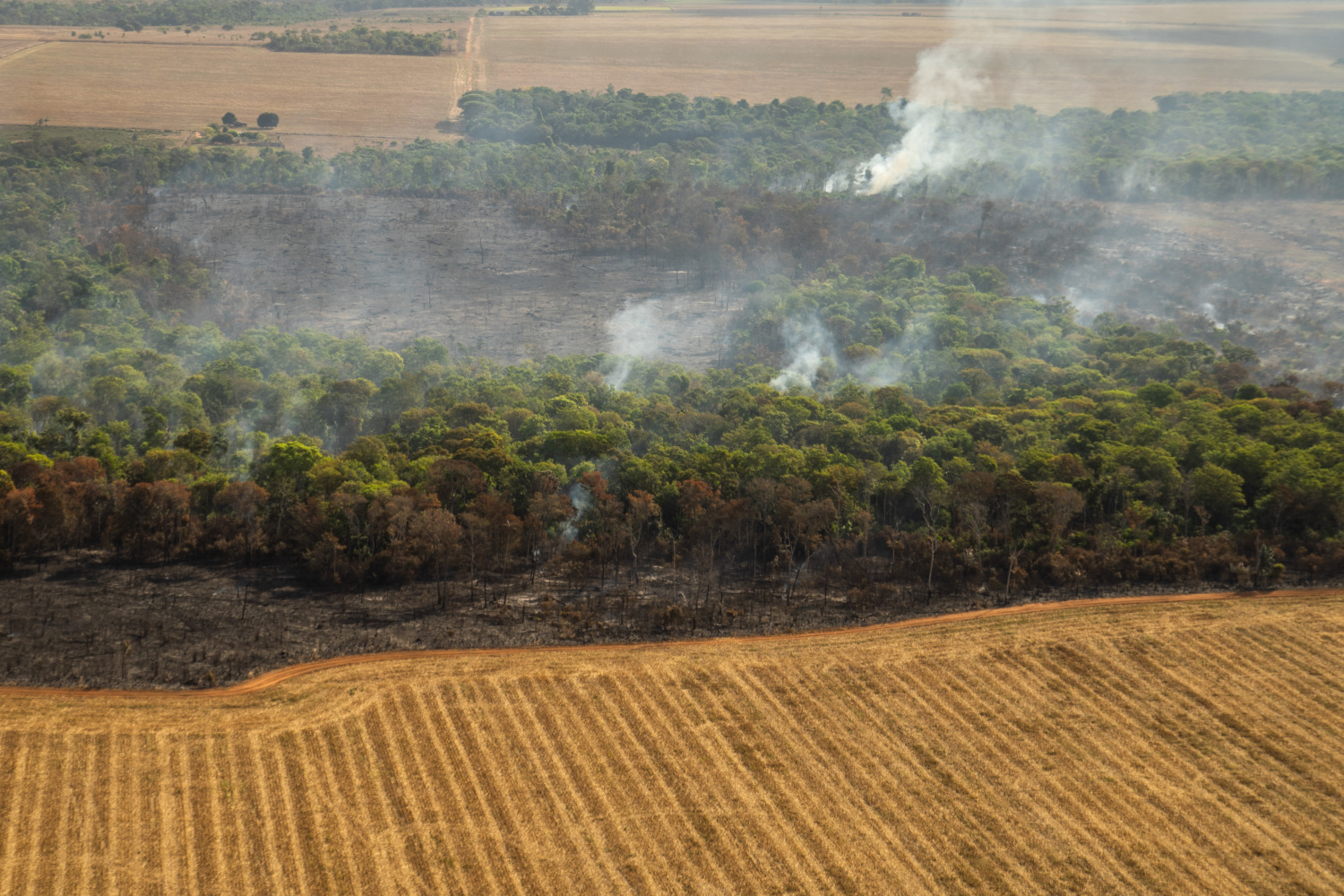
Civil society calls for JBS to be stripped of A minus climate rating
Civil society calls for JBS to be stripped of A minus climate rating
Environmental disclosure group CDP raised Brazilian meat giant’s climate score despite JBS’s huge climate emissions and dire deforestation record
Letter to CDP_JBS Score complaint_16 March 2023
A global coalition of twenty civil society groups is calling for CDP (formerly the Carbon Disclosure Project) to revoke the recent A minus score and “Leadership” status awarded to meat giant JBS for its efforts on addressing climate change, amid widespread concerns over rampant greenwashing. Led by Mighty Earth, some of the biggest CSOs, including the Institute for Agriculture & Trade Policy (IATP), Friends of the Earth, Compassion in World Farming, Soil Association and Rainforest Foundation Norway, have joined forces to call out the high grading.
Background
CDP is a global disclosure system used by investors, companies, cities, and regions to measure and act on their climate and environmental impacts. The system is widely regarded as one of the gold standards of environmental reporting, but its approach depends on self-declared responses, raising concerns from CSOs about the accuracy of scores being awarded to companies.
According to CDP, organisations earning a score in the top “Leadership” level “must show environmental leadership, disclosing action on climate change, deforestation or water security” and companies awarded an A minus are “implementing current best practices.” In the case of JBS, this could not be further from the truth. Analysis shows JBS is the single largest corporate greenhouse gas emitter in the animal agriculture sector and the biggest corporate driver of deforestation in Brazil.
Greenwashing claims
JBS has been accused of greenwashing in a whistle-blower complaint to the US Securities and Exchange Commission (SEC) filed by Mighty Earth. Evidence highlights that $3.2 billion worth of “green bonds” issued by JBS were misleading to investors and allegedly fraudulent. The meat giant has pledged to be net zero by 2040 but independent researchers found it lacks any meaningful decarbonisation plan. Meanwhile, JBS continues to promote its improved climate change rating from CDP, and regularly cites its CDP score with investors. Notably, JBS did not make its 2022 Climate Change response to CDP public.
Alex Wijeratna, Senior Director at Mighty Earth said:
“This is a serious case of greenwashing by JBS, who are promoting their new A minus climate score to attract investors. It’s highly misleading for JBS, a notorious Amazon forest destroyer, and one of the world’s largest climate polluters, to receive CDP’s top climate ‘Leadership’ rating.”
“We’re also seriously concerned that JBS may have misreported in its CDP 2022 Forests disclosure, claiming zero hectares of known or estimated deforestation in its cattle supply chain since 2008. This despite a litany of reports and confirmed cases of deforestation linked to JBS beef supplies since then. We’re urging CDP to withdraw JBS’ A minus Climate Change score immediately and to more broadly reassess its climate scoring methodology.”
Shefali Sharma, Director of the Institute for Agriculture & Trade Policy’s European office said:
“JBS has the largest climate footprint compared to all other livestock companies with a goal to achieve net zero ten years earlier than others. Yet it consistently refuses to publish its full scope of emissions, let alone the number of animals in its supply chain. There’s a fundamental flaw in the current voluntary system of corporate climate governance in that CDP derives over 30% of its revenue from the companies it appraises. We need robust rules for corporate emissions reporting and verification that result in independent appraisal and the elimination of conflicts of interest.”
Nusa Urbancic, Campaigns Director at Changing Markets said:
“JBS getting a high climate score points to the glaring methodology gap of third-party scoring organisations, like CDP. Our research indicates that JBS alone is responsible for methane emissions comparable to combined livestock methane emissions of France, Germany, Canada, and New Zealand, yet lacks any plan to address or even adequately report these potent emissions. We desperately need governments to step in, set climate targets and harmonised rules for reporting for big meat industry giants that are heating up our planet.”
CDP’s contribution to environmental transparency is widely recognised worldwide. However, it is evident that rather than relying on voluntary self-reporting alone, CDP’s scoring methodology needs to consider the public evidence available to ensure accurate scores are awarded. Updates to CDP’s scoring approach should include:
- Independent evaluation of companies’ performance on measuring and reducing emissions, not just paper commitments and self-reporting.
- All companies to undergo risk evaluations and any adjustments to scores be openly communicated.
- All submissions to be made publicly available to enable independent third-party verification and to avoid underreporting or greenwashing.
- A scoring methodology with specific criteria that prioritise performance and must be met for companies to achieve a score within each of CDP’s scoring levels.
- Food and Agricultural sectors report total animal slaughter numbers and milk intake to support an accurate Scope 3 emissions figure.
Ends
Notes to Editors
Links to analysis of JBS’ performance and practices:
Emissions
- Recent analysis from the Institute for Agriculture & Trade Policy (IATP) and Changing Markets Foundation estimates JBS’s total emissions to be 288 MtCO2e, exceeding the entire emissions of Spain in 2021.
- JBS ranked top position in a list of 15 of the world’s largest meat and dairy companies for its methane emissions.
- JBS currently fails to report its complete ‘Scope 3’ emissions: producing meat throughout its entire supply chain, where most of its climate impact lies.
- Mighty Earth say JBS has failed to disclose the number of cattle and other animals it slaughters annually since 2017, which is crucial for evaluating its emissions claims.
Deforestation
- JBS ranks the worst performing company in Mighty Earth’s Soy & Cattle Deforestation Tracker, achieving only one point out of a possible 100.
- Chain Reaction Research estimated that JBS’s deforestation footprint in Brazil is up to 200,000 hectares in its direct supply chain, and 1.5 million hectares in its indirect supply chain since 2008.
- Global Witness, Greenpeace, and EIA (Environmental Investigation Agency) highlighted JBS’s continued links to illegal deforestation, operating illegally on protected Indigenous land, and/or making purchases linked to human rights abuses.
- Despite the numerous links to deforestation, some of which JBS recently admitted to, JBS reported that”0 hectares of known or estimated deforestation/conversion” have occurred for cattle products since 2008 in its 2022 CDP Forests disclosure, for which it scored a B.
- JBS does not plan to eliminate deforestation across its global supply chain until 2035 – giving suppliers 13 more years to bulldoze.
Emissions targets and alleged greenwashing
- In 2021, JBS committed to becoming “Net Zero” across its entire value chain by 2040, but the true scope of the pledge is unclear, given the company grossly underreports its Scope 3 emissions.
- JBS’s 2030 emission reduction target for Scope 1 and 2 is highly ambiguous and misleading, as it is unclear if the company aims for absolute or emissions intensity reductions.
- JBS were asked to remove the Science-Based Targets initiative (SBTi) logo it previously cited on the Achievements and Certifications page of its website, despite SBTi not having validated its targets. JBS’s lack of measurement and reporting on Scope 3 emissions contradicts the criteria set by the SBTi, which requires companies to set Scope 3 targets if these emissions make up over 40% of the company’s overall GHG footprint.
- A complaint to the US Securities and Exchange Commission (SEC) filed by Mighty Earth accuses JBS of misleading investors and calls for a full investigation into $3.2 billion worth of “green bonds” issued by the company. The evidence highlights that JBS’s “Sustainability-Linked bonds” were misleading to investors and allegedly fraudulent.
No meaningful decarbonisation plans
- An evaluation of companies’ climate pledges by the New Climate Institute and Carbon Market Watch ranked JBS “Very low” in both its “Integrity” & “Transparency” categories, for the second year running. The assessment of JBS’s overall net zero efforts concludes: “The company plans to continue growth in a GHG emission-intensive industry; we did not find evidence of any planned deep decarbonisation measures. JBS does not have an emission reduction target alongside its net-zero emission target for 2040. Its interim targets for 2030 would lead to a 3% emission reduction compared to its reported 2021 emissions.”
- Instead of JBS’s emissions footprint shrinking as it heads toward “Net Zero,” recent estimates by IATP and Changing Markets continue to show it has grown by a minimum of 17% between 2016 and 2021.
- JBS does not have any methane action plan that would align with the Global Methane Pledge, nor does it report its methane emissions, as recommended in the UN report on Net Zero Commitments.
For more information or to arrange an interview please contact:
Carole Mitchell, Senior Director of Communications (based UK)
+44 7917 105000
Syd Jones, Press Secretary (based US EST)
+1 561 809 5522
Cecelia Brackey, Media, and Communications Manager at IATP (based US, CST)
+ 1 651-328-4706
Nusa Urbancic, Campaigns Director at Changing Markets (based UK)
About Mighty Earth
Mighty Earth is a global advocacy organization working to defend a living planet. Our goal is to protect half of Earth for Nature and secure a climate that allows life to flourish. We are obsessed with impact and aspire to be the most effective environmental advocacy organization in the world. Our team has achieved transformative change by persuading leading industries to dramatically reduce deforestation and climate pollution throughout their global supply chains in palm oil, rubber, cocoa, and animal feed, while improving livelihoods for Indigenous and local communities across the tropics.


